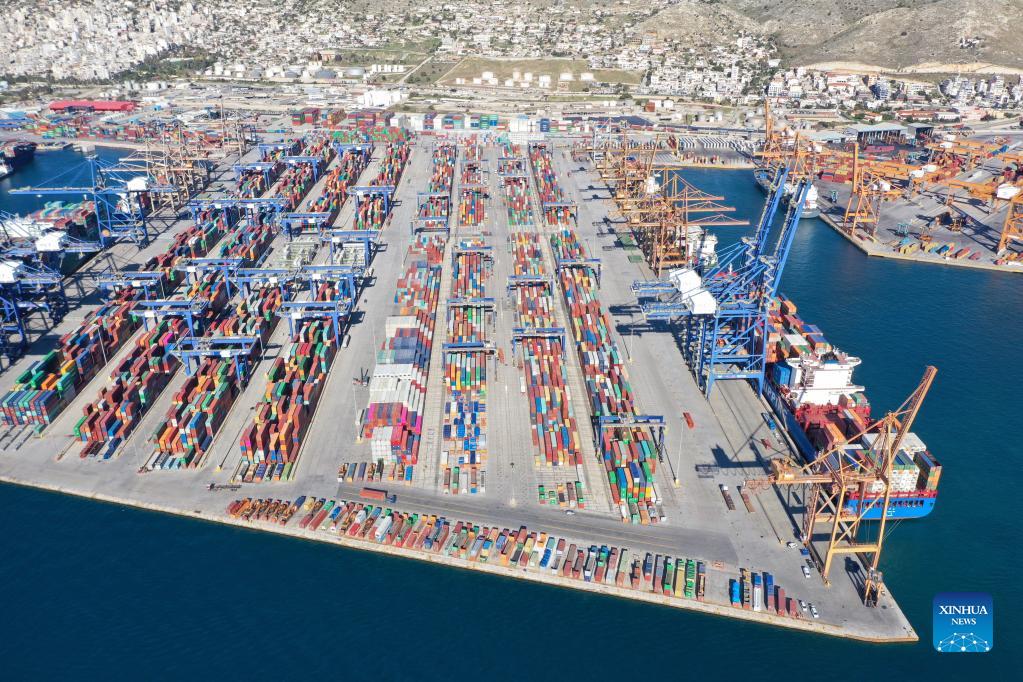Over 80 pct of countries and regions receive investments from China as of 2020: report

Aerial photo taken on Jan. 16, 2019 shows the Piraeus port in Greece. (Xinhua/Wu Lu)
Junhe Pumps Holding Co., Ltd. based in Ningbo, east China’s Zhejiang province has opened two branch companies in North America and Europe in the past two years in a bid to better satisfy the needs of local clients with products that can adequately suit their preferences.
“As we make more investments in foreign countries, we are full of confidence in kicking off new projects,” said Zhang Junbo, general manager of the company.
“We registered a compound annual growth rate of 16.7 percent over the course of three years in North America. We also built digital factories so as to increase the added value of our products,” Zhang introduced, adding that their products have not only met the demand of foreign clients but also are indicative of a wider industry trend.
The enthusiasm seen at Chinese companies when investing in foreign countries epitomizes the rising quality and quantity of foreign investments that China has made. According to a government statistical bulletin released earlier this year, China’s outbound direct investment (ODI) soared 12.3 percent on an annual basis to reach $153.71 billion in 2020, with the flow scale ranking first in the world for the first time.
Flows of China’s ODI accounted for more than 10 percent of the world’s total for five consecutive years, reaching 20.2 percent of the globe’s total in 2020. The country’s ODI stock amounted to $2.58 trillion and ranked third among the largest investors in the global market by the end of 2020.
Last year, China’s ODI mainly went to 18 industries, with nearly 70 percent of it going to leasing and commercial services, manufacturing, retail and wholesaling, and financial sectors. The flows of China’s ODI into these four industries all exceeded $10 billion.
“A lot of indicators mentioned in the bulletin, including reinvested earnings that remained at a high level, and the fact that the investment scale from the non-public sector of the economy surpassed that of the public sector in the economy, all indicated that Chinese enterprises have taken a stride forward in becoming involved in the global value chain and that their global competitiveness and ability to make investments have improved on a steady basis,” said Ge Shunqi, a researcher with Nankai University focusing on international investment.
By the end of 2020, more than 80 percent of the countries and regions around the world had received some form of investment from China, with 28,000 Chinese enterprises having established 45,000 companies in 189 countries and regions around the world.
The bulletin further revealed that a total of $22.54 billion was invested in countries along the Belt and Road in 2020, which accounted for 14.7 percent of China’s overall ODI and which also witnessed a year-on-year increase of 20.6 percent. By the end of 2020, the country’s ODI stock in countries along the Belt and Road stood at $200.79 billion, accounting for 7.8 percent of its total ODI stock.
Last year, Chinese companies completed 84 cross-border mergers and acquisition projects at a total combined worth of $3.15 billion in countries along the Belt and Road, accounting for 11.1 percent of the total value of foreign mergers and acquisitions carried out in the same year.
“China’s investment cooperation with other countries has delivered mutual benefits for both sides, which proves how significant financial interconnectivity is in pushing for high-quality co-construction of the Belt and Road,” Ge explained.
Ten years since the Chinese company COSCO Shipping started managing the container terminals at Piraeus port, the image of Greece’s largest port has changed dramatically. According to Tassos Vamvakidis, a manager of Piraeus Container Terminal S.A (PCT), COSCO Shipping’s subsidiary in Piraeus, it was the Chinese company that helped the port out of its difficulties, which has since seen a reversal in its fortunes.
In 2019, the port handled a total of 5.65 million 20-foot equivalent units (TEUs), compared with 880,000 in 2010, making it the top port in the Mediterranean. That year, it contributed 600 million euros to Greece’s economy. “The port plays a vital role in boosting local economic development and improving people’s livelihoods,” said Vamvakidis. More than 3,000 people have been hired to do the services outsourced by COSCO, with thousands of more jobs having also been created in peripheral industries, he revealed.
Photos
Related Stories
- China's transport investment reaches nearly 2.2 trln yuan in Jan.-Aug.
- Bangladesh welcomes more Chinese investment: minister
- Chinese investment in Africa registers steady growth: report
- Pledged Chinese investment in Nepal surges in 2 months of new fiscal year
- China's fixed-asset investment up 8.9 pct in Jan.-Aug.
- Over 500 deals signed in int'l investment fair in China's Xiamen
Copyright © 2021 People's Daily Online. All Rights Reserved.










